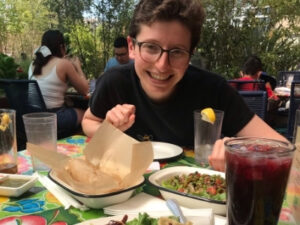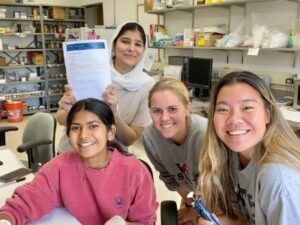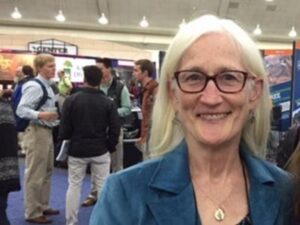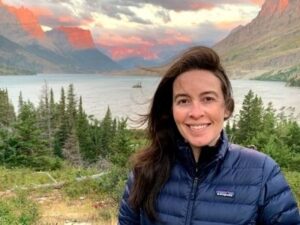Every year, the COE awards fellowships to fund summer research opportunities for Wesleyan students across all majors and class years. Brionna Colson-Fearon ’22 is a biology and psychology double major who conducted a qualitative study looking at food apartheid in Baltimore, Maryland, and the role urban farming plays in increasing access to healthy food in the city. The research is a part of her ongoing interests in obesity and public health outcomes of African American communities in urban contexts. Colson-Fearon received the 2022 Clendeninn Prize for her outstanding work and contributions as a biology major at Wesleyan.
research
student, faculty & faculty-student research
woolford ’22 and friends to host party at the edge of the world
 Every year, the COE awards fellowships to fund summer research opportunities for Wesleyan students across all majors and class years. Liz Woolford ’22 is a theater and government double major whose summer research project focused on developing her theater capstone project: The Party at the Edge of the World, an investigation into the intersection of performance and environmental activism. The project will culminate in a site-specific/immersive piece to be performed Friday, November 19 through Sunday, November 21, 2021, here at the COE at 284 High Street. Reservations are required for this FREE event.
Every year, the COE awards fellowships to fund summer research opportunities for Wesleyan students across all majors and class years. Liz Woolford ’22 is a theater and government double major whose summer research project focused on developing her theater capstone project: The Party at the Edge of the World, an investigation into the intersection of performance and environmental activism. The project will culminate in a site-specific/immersive piece to be performed Friday, November 19 through Sunday, November 21, 2021, here at the COE at 284 High Street. Reservations are required for this FREE event.
pipkin ’22 podcast to investigate land use in the smokies
Every year, the COE awards fellowships to fund summer research opportunities for Wesleyan students across all majors and class years.
Abi Pipkin ’22 is a government and environmental studies major interested in the question of land management in the United States. This summer she explored the Great Smoky Mountains region of Eastern Tennessee and Western North Carolina to learn more about how the privatization of land affects human stewardship of natural resources. The interviews and research she conducted will form a podcast she is developing this semester as part of her senior capstone for the environmental studies and government majors.
raynor seeks to illuminate illegal and small-scale fishing
Jennifer Raynor is assistant professor of economics at Wesleyan. Her research focuses on natural resource management, with an emphasis on measuring the unintended consequences of rules and regulations. In fall 2021, she is teaching ECON210/Climate Change Econ and Policy. She joined the faculty of the COE in spring 2021.
levan ’22 indulges appetite for entomophagy
 Every year, the COE awards fellowships to fund summer research opportunities for Wesleyan students across all majors and class years. Megan Levan ’22 is an environmental studies and South Asia studies in a global context (university major) major who was recently elected Wesleyan’s Gamma Chapter of Phi Beta Kappa. Megan’s research this summer centered on how edible insect-based products are being promoted by companies and received by consumers in countries not known for their entomophagic practices. Megan believes diets of the future will need to be supplemented with other available protein sources, and her research explored how insects fit into the picture.
Every year, the COE awards fellowships to fund summer research opportunities for Wesleyan students across all majors and class years. Megan Levan ’22 is an environmental studies and South Asia studies in a global context (university major) major who was recently elected Wesleyan’s Gamma Chapter of Phi Beta Kappa. Megan’s research this summer centered on how edible insect-based products are being promoted by companies and received by consumers in countries not known for their entomophagic practices. Megan believes diets of the future will need to be supplemented with other available protein sources, and her research explored how insects fit into the picture.
scobell ’22 & parikh ’22 spend summer sequencing fish genome

Every year, the COE awards fellowships to fund summer research opportunities for Wesleyan students across all majors and class years. Sophie Scobell ‘22 is a biology and East Asian studies double major. Aashni Parikh ‘22 is an earth & environmental sciences and biology double major. Scobell and Parikh, along with Fatima Ejaz, ’22 and Helen Lei ’23, spent the summer in the Chernoff Lab, setting out to sequence what will be only the fifth fully sequenced fish genome.
o’connell explores cryosphere growth and demise

Suzanne O’Connell is the Harold T. Stearns Professor of Earth Science at Wesleyan. She studies Antarctic paleoclimate using marine sediment cores from IODP (International Ocean Discovery Program) in order to understand how Antarctica has changed in the past, information that will help researchers to understand and model future climate change. In fall 2021 she is teaching CIS221/Research Frontiers in Sciences and E&ES497/Senior Seminar.


